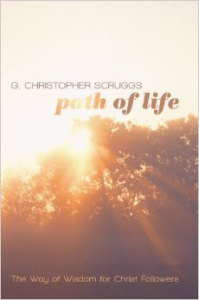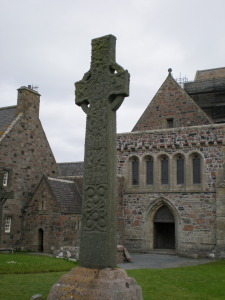Then Job replied: “Indeed, I know that this is true. But how can mere mortals prove their innocence before God? Though they wished to dispute with him, they could not answer him one time out of a thousand. His wisdom is profound, his power is vast. Who has resisted him and come out unscathed? … When he passes me, I cannot see him; when he goes by, I cannot perceive him. If he snatches away, who can stop him? Who can say to him, ‘What are you doing?’ … “How then can I dispute with him? How can I find words to argue with him? … “He is not a mere mortal like me that I might answer him, that we might confront each other in court. If only there were someone to mediate between us, someone to bring us together, someone to remove God’s rod from me, so that his terror would frighten me no more. Then I would speak up without fear of him, but as it now stands with me, I cannot. (Job 9:1-4, 11-21, 14, 32-35).
There is no question a pastor hears more frequently than, “Why does God permit suffering and evil?” It comes in many forms. It comes when a child dies or has an incurable disease. It comes when someone is seriously injured in a freak accident. It comes when there is a natural disaster that inexplicably takes the lives of many innocent people. It happens when some great injustice is discovered. [i]
In Path of Life, I tell a story concerning “Jane,” a mother of several young children, who contracted an incurable disease.[ii] Naturally, her Christian friends and Sunday school class prayed for her healing. For a time, the cancer went into remission. Unfortunately, the remission was only temporary. After a time the disease returned, and there was little that the doctors could do. All this time, her well-meaning Christian friends continued to pray for her. After a time, they began to wonder why their prayers were not answered. Finally, they came to the conclusion that it must be that there was some unconfessed sin in Jane’s life preventing God from answering their prayers. Of course, Jane confessed every sin she could imagine, but there was still no healing. Her prayer partners were unsatisfied, until finally a more mature Christian friend stepped in to assure the young mother that her suffering might have nothing to do with sin, and her lack of healing certainly could not be related to any failure to repent. How could well-meaning Christians be so insensitive? A partial answer is that we, like the wise men of old, want a just and fair universe. We all want to believe that the created universe will be predicable, that good will be rewarded, and evil punished. When things don’t turn out that way, we wonder, “Why?”
Job: The Problem of Suffering.
 Job is introduced to a reader as the the most righteous, God-fearing person of his generation. He is healthy, wealthy and blessed. Everyone respects him. Then, one day, Satan convinces God to take away his hand of protection from Job. Satan believes that Job must not truly love God, but only respect and follow God’s laws because of the blessings he receives. God believes this is not true. In order to settle the argument, they enter into a wager, and God allows Satan to deprive Job of all his blessings, health, family, wealth, friendship, respect of others—all these things are taken away. Three friends come to comfort Job, but when Job loudly complains about his suffering, they begin to defend God and accuse Job. Basically, they primarily argue that Job must deserve his punishment, either personally or as a member of the human race afflicted by sin. Job must have sinned as all people do. Job needs to accept God’s discipline and repent. Over and over again in the book, Job argues against the various explanations of his friends, continually defending his own righteousness and the unfairness of his suffering. .
Job is introduced to a reader as the the most righteous, God-fearing person of his generation. He is healthy, wealthy and blessed. Everyone respects him. Then, one day, Satan convinces God to take away his hand of protection from Job. Satan believes that Job must not truly love God, but only respect and follow God’s laws because of the blessings he receives. God believes this is not true. In order to settle the argument, they enter into a wager, and God allows Satan to deprive Job of all his blessings, health, family, wealth, friendship, respect of others—all these things are taken away. Three friends come to comfort Job, but when Job loudly complains about his suffering, they begin to defend God and accuse Job. Basically, they primarily argue that Job must deserve his punishment, either personally or as a member of the human race afflicted by sin. Job must have sinned as all people do. Job needs to accept God’s discipline and repent. Over and over again in the book, Job argues against the various explanations of his friends, continually defending his own righteousness and the unfairness of his suffering. .
A Problem in the Wisdom Tradition
Thus far in this series of articles on wisdom, we have been dealing with what I might call “basic, elementary, practical and moral wisdom.” We have been dealing with the basics of how to conduct ourselves so that we make good decisions in life, manage our affairs wisely, and have sound human relationships. In this blog, we come to deeper issue and problem beyond a superficial understanding of wisdom. If before we could come to a kind of human understanding of how to live wisely, now we must be satisfied with a mystery.
The wisdom tradition holds, as one of its most basic teachings, that the wise, prudent, righteous, God-fearing life is the blessed life. However, the ancient Jewish wise men and women were not unrealistic romantics. They saw that life is often unjust. They were as aware of the injustice of much human suffering as any modern cynic. Therefore, they asked the question, “Why?” “Why would a righteous, holy God permit innocent people to suffer undeserved harm?” We have exactly the same questions as the ancient wise men and women. We, like them, can see that good people are not always blessed and sometimes suffer terribly. We see in our own lives and in the lives of others that a lot of suffering is not deserved or is hugely disproportionate to what we deserve. We also see that unrighteous, irreligious, even evil people sometimes never suffer for their deeds and misdeeds. We see that evil people often avoid punishment for their sins and appear more blessed than those who seek to do God’s will. We wonder how a righteous God could allow such a situation. No matter how much we think about the problem, the problem remains only partially and inadequately answered.
In response to Job’s suffering and complaints against God, Job’s friends all argue for God’s justice. They are not persuasive for a basic reason: at the beginning of Job we are told that there is no satisfactory human reason for Job’s suffering (Job 1:1-2:7). God, in inspiring the writer or writers of Job, did not want to give us easy or pat answers. He wanted us to recognize that the problem of suffering is a divine mystery we will never fully understand (Job 38-42).
Jesus and the Problem of Suffering
In the New Testament, there is a story about a man blind from birth. Jesus’ disciples, formed in the culture of the Jewish faith, knew that traditional Jewish teaching requires that suffering have some explanation in sin. So they asked Jesus, “Who sinned, this man or his parents that he was born blind” (John 9:1-2)? The disciples posed the same questions to Jesus that Job poses: “Would someone please explain suffering to us?” Jesus does not answer his disciples on the basis of the wisdom tradition. Instead he says, “Neither this man nor his parents sinned,” said Jesus, “but this happened so that the works of God might be displayed in him” (John 9:3). It is as if Jesus is turning the question of his disciples into a demonstration of the loving presence of God.
This leads to another way of looking at Job. The wisdom teachers were so focused on the wisdom and the power of God that they did not address the real question people have: “If God is a God of Love, then how can God allow suffering?” If there is an explanation that we can accept, it will come in the form Jesus revealed: a suffering God, a God who is present with us in our suffering and who works in self-giving love to redeem suffering from within human history and human life. In other words, any attempt to create a wisdom of suffering, takes us beyond our previous ideas of God to the feet of a God who is himself present in human suffering and redeeming it. God is not outside of our suffering but within it.
In the end, neither Job, nor the disciples, nor contemporary people, nor a philosopher, nor a theologian, nor a pastor can satisfactorily explain suffering. It is a part of life we must endure. There is an old gospel hymn that puts it this way:
“Jesus walked this lonesome valley;
He had to walk it by himself.
Oh, nobody else could walk it for him;
He had to walk it by himself.
“We must walk this lonesome valley;
We have to walk it by ourselves.
Oh, nobody else can walk it for us;
We have to walk it by ourselves.”
The writer of the hymn almost had it right. Jesus had to walk the long road to Calvary alone, and he cried out “My God, My God, why have you forsaken me” (Mark 15:34). [iii] He cried out in solidarity with every sufferer—past, present, and future. However, there has always been something about this old gospel hymn that bothered me. It stops too soon. By faith, we hear another verse that goes something like this,
“When we walk our lonesome valley, We don’t walk it by ourselves. For, Jesus Christ, he walks it with us; W e don’t walk it by ourselves.”
I don’t know about you, but when I feel abandoned by God and by human beings in a moment of suffering, it is helpful to sense that God is still present in Christ redeeming and sanctifying what I cannot understand.
Christians and Suffering
 All of us are going to have two experiences in life: we are going to suffer, and we are going to have friends that suffer. When we suffer, it is important not to deny the suffering. Suffering is real, it is painful, and it threatens our relationships with God and others. God understands this. There is no sense in not being totally honest with God about how we feel. God knows how we feel. One thing that everyone who reads Job immediately understands is that Job is not suffering in silence. He expresses to his friends and to God what he feels. Finally, suffering is an area where we need to understand the difference between being faithful and understanding. Faithfulness is not enjoying what is happening to us or understanding what God is doing in and through our suffering. It is accepting what God is doing and living through it. Suffering is always a test of patience and endurance.
All of us are going to have two experiences in life: we are going to suffer, and we are going to have friends that suffer. When we suffer, it is important not to deny the suffering. Suffering is real, it is painful, and it threatens our relationships with God and others. God understands this. There is no sense in not being totally honest with God about how we feel. God knows how we feel. One thing that everyone who reads Job immediately understands is that Job is not suffering in silence. He expresses to his friends and to God what he feels. Finally, suffering is an area where we need to understand the difference between being faithful and understanding. Faithfulness is not enjoying what is happening to us or understanding what God is doing in and through our suffering. It is accepting what God is doing and living through it. Suffering is always a test of patience and endurance.
Job’s three friends do not fare well in the eyes of commentators or in God’s eyes. Before we criticize his friends, we do need to remember that they were there for Job. Hearing of his misfortune, they came to be with him for seven days and seven nights. (Seven and three being perfect numbers in Jewish numerology, we might see in his friends a perfect attempt to console a sufferer.) The fact that they sat silently before the destitute and deformed figure of their friend speaks well of them. They tried as best they knew to comfort him. They did not begin with a series of sermons on sin and its consequences. Nevertheless, they fell into a temptation into which we too easily fall: the temptation to defend God and explain suffering. Job’s friends did well when they were simply present for their friend, Job. They erred when they began to talk.
When our friends are suffering, we need to be present, as Job’s friends were present. People need to know we care—and we need to show we care in words and in deeds. Some years ago friends of ours suffered a loss. Kathy went immediately to be with the wife. Immediately after church, I went to be with the husband. We cried and sat together. We helped with arrangements and around the house. We spoke about the loss with them, and we tried not to minimize or deny the tragedy. We spent time with them after the event was over. Years later, they mentioned that they appreciated that we were there, that we did not try to explain, and we were not afraid to talk about and sympathize with their loss. Sometimes, all we can do is come, love, sympathize, and be silent. That is enough.
The Present One
In the end, suffering cannot be explained; it can only be endured. Job does not come to understand his suffering by an exercise of human wisdom. He comes to understand that as a human being he cannot know the secret purposes and counsels of God (Job 40:4). The answer to the problem of undeserved suffering, if it can be found, cannot be found in the human wisdom tradition.
Where, then, is God in our suffering? Perhaps the best explanation is that God is in the midst of it all in Christ, the Word of God, suffering with every sufferer, taking upon himself the guilt and pain of the world, deserved and undeserved. In the words of the scientist turned religious thinker, John Polkinghorne:
“He is not a spectator, but a fellow-sufferer, who has himself absorbed the full force of evil. In the lonely figure hanging in the darkness and dereliction of Calvary, the Christian believes that he sees God opening his arms to embrace the bitterness of the strange world he has made. The God revealed in the vulnerability of the incarnation and in the vulnerability of creation are one. He is the crucified God, whose paradoxical power is perfected in weakness, whose self-chosen symbol is the King reigning from the gallows.” [iv]
On the Cross we see revealed the truth that God not only reigns in glory over his creation, but paradoxically, suffers the travail of its finitude, incompleteness, sin, and suffering. In the end, the wisdom tradition points beyond itself to One greater than Wisdom—to the Crucified and Suffering Savior of the world.
[i] It is helpful to think about the kinds of suffering we undergo in order to fully appreciate the difficulty of the subject matter. There is, of course, the suffering we all bring upon others and ourselves because of stupidity, finiteness and evil. Others or we make a practical or moral mistake and suffer the consequences. This kind of evil, we may call “moral evil.” The suffering of Europe under Hitler do to the moral mistakes of the German and other peoples and Hitler’s own evil is the most common example. There is another kind of suffering we endure: “natural suffering.” We live in a world in which there are tornadoes, earthquakes, hurricanes, cancer and various life and health threatening disasters. Many people cannot understand why the world could not have been made differently. It is helpful, I think, to remember that any world capable of producing the human race is capable of producing natural disasters and disease. See, John Polkinghorne, Exploring Reality: The Intertwining of Science with Religion (London, ENG: SPCK, 2005), chapter 8 for a long and, I think, very helpful discussion of this problem.
[ii] A large part of this blog is based on G. Christopher Scruggs, Path of Life (Eugene, OR: Wipf & Stock, 2014), 179-193. As I say in the book, the vignettes are not reflective of actual incidents, but composites of many years of ministry.
[iii] In crying out these words, Jesus is quoting Psalm 22, which begins as a hymn of abandonment in suffering, but ends as a hymn of praise for deliverance. Against those who see in the words of Jesus a simple cry of abandonment, I like to think it is both a cry of abandonment and a cry of faith in God’s delivering power, even from death.
[iv] John Polkinghorne, Science and Providence: God’s Interaction with the World (Philadelphia, PA: Templeton Foundation Press, 1989), 79.
Copyright 2014, G. Christopher Scruggs, All Rights Reserved
 Today, I am posting to alert readers that I have now republished a Second Revised Edition of Centered Living/Centered Leading: The Way of Light and Love. Frankly, I did not like the numerous typographical errors in the book and also wanted to slightly revise some of the wording. In the Preface to Second Edition I note that it is four years since I finished the first edition. In the interim, some of the situations that pushed me to write the book have come to completion and new challenges and problems have arisen. The book is often a part of my early morning routine and a companion during times of stress and difficulty. What fascinates and encourages me is the utility of the book in working out problems, and especially problems that find their source in people and their conflicts. I believe the book continues to prove its utility, at least in my life and work.
Today, I am posting to alert readers that I have now republished a Second Revised Edition of Centered Living/Centered Leading: The Way of Light and Love. Frankly, I did not like the numerous typographical errors in the book and also wanted to slightly revise some of the wording. In the Preface to Second Edition I note that it is four years since I finished the first edition. In the interim, some of the situations that pushed me to write the book have come to completion and new challenges and problems have arisen. The book is often a part of my early morning routine and a companion during times of stress and difficulty. What fascinates and encourages me is the utility of the book in working out problems, and especially problems that find their source in people and their conflicts. I believe the book continues to prove its utility, at least in my life and work. For those who prefer a specifically Christian working out of the implications of a wisdom approach to Christian faith and life, my book Path of Life attempts to confront the problems of contemporary society and its rejection of Christian faith and morals in one long sustained argument for the reality of Christian faith, morals, and wisdom. I would not have spent the time I spent writing the book if I did not think it made an important point for how contemporary Christians can best serve our culture.
For those who prefer a specifically Christian working out of the implications of a wisdom approach to Christian faith and life, my book Path of Life attempts to confront the problems of contemporary society and its rejection of Christian faith and morals in one long sustained argument for the reality of Christian faith, morals, and wisdom. I would not have spent the time I spent writing the book if I did not think it made an important point for how contemporary Christians can best serve our culture.





























